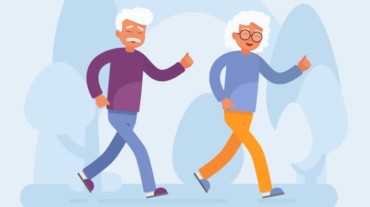
Most of the older adults in our families aren’t quite fond of working out. It isn’t like they don’t understand the importance of it but usually give in to laziness instead of exercising. What if we tell you that we’re giving you a reason to motivate them to exercise? Well, a new study has revealed that older adults who are physically active have better mental and physical health.
An overall better physical and mental health has been noticed in older adults who have higher physical activity and lower sitting time, as per the findings of a new study from the American Cancer Society (ACS).
The study, published in the journal CANCER, suggests that higher levels of regular moderate to intense physical activity along with a lower duration of sedentary time are associated with better mental and physical health for older cancer survivors and older adults, in general.

There is a need to identify strategies associated with healthy ageing and improving the quality of life for ageing cancer survivors. Being physically active is related to several health benefits, and in this study, ACS investigators led by Dr Erika Rees-Punia analysed self-reported aerobic and muscle-strengthening physical activities, sitting time, and mental and physical health among nearly 78,000 participants in the ACS’s Cancer Prevention Study II Nutrition Cohort. Participants (average age 78 years) included older cancer survivors up to 10 years post-diagnosis, and cancer-free adults.
The investigators found that regardless of cancer history, the differences in global mental and physical health between the most and least active, and the least and most sedentary, were clinically meaningful.
These findings provide evidence for the importance of engaging in regular physical activity and decreasing sitting time as a reasonable non-pharmacologic strategy to improve quality of life in older men and women, with or without a prior cancer diagnosis.
In fact, the recently published ACS physical activity guidelines recommend that adults get 150-300 minutes of moderate-intensity activity or 75-150 minutes of vigorous-intensity activity through the week, and to limit sedentary behaviours such as screen-based entertainment.
“The findings reinforce the importance of moving more and sitting less for both physical and mental health, no matter what your age or history of cancer,” said Rees-Punia.
“This is especially relevant now as so many of us, particularly cancer survivors, maybe staying home to avoid covid-19 exposure, and maybe feeling a little isolated or down. A simple walk or other physical activity that you enjoy may be good for your mind and body.”
Also, watch:
Select Topics of your interest and let us customize your feed.
PERSONALISE NOWYes, we know you are all excited to get your parents and grandparents to accompany you while working out but be cautious of their age and health condition. Only opt for low impact exercises like:
These exercises won’t impact their muscles or joints but will make them feel rejuvenated.
(With inputs from ANI)